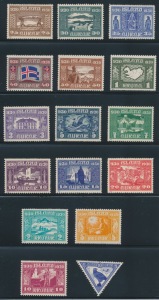Some countries have small populations, stable domestic politics and little international impact but yet are philatelically very popular and important. Two countries that fit this model are Liechtenstein and Iceland. Both are part of a larger philatelic collecting group (in the case of Liechtenstein it is the Swiss-German area and for Iceland it is the Scandinavian area). This means that these areas enjoy popularity far in excess of what would be natural, based on their internal population. The entire country of Iceland has a population of 330,000, a number that would scarcely support any domestic philatelic market. Liechtenstein is even smaller. What creates the popularity of these countries is their incorporation into the larger philately of the geographic group of which they belong. For many years this has been reflected in the albums that Scott produces as part of the Scott specialty series. There is a set of albums for Scandinavia which incorporates Iceland within the other countries of Northern Europe, which are far more populous, wealthy and with a much larger internal collector base. The advantages of collecting Iceland are many. The stamps are well designed and there are few rarities beyond the reach of most collectors. For some reason that I have never understood that Scott values of Iceland stamps are very high relative to the selling prices of the stamps. (This is not a temporary aberration resulting from some short term supply and demand issue. Rather it has been this way, at least, for the fifty years I have been involved with stamps). What this means is that you can buy high quality popular and rare sets for a quarter to a third of Scott catalog whereas for many countries such sets cost in the 40-50% range and for US stamps often 60-75%. Don’t let this go to your head-you’ll get a lower percentage of Scott when you go to sell, but dollar for dollar Iceland is about as interesting and well priced a country as you could collect.



